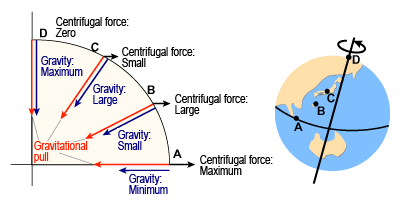Error Caused by Difference in Gravity at Different Latitudes
When the installation site for an electronic balance is changed due to a relocation, etc., appropriate weights must be placed again at the new site to re-adjust (calibrate) the balance. Though people are prone to think that differences will probably be slight, an error that cannot be ignored at all occurs when measuring mass precisely.
The following is the first in the series "Causes of Error on Balances" and deals with error caused by difference in gravity at different locations.
● Electronic Balances Are Gravimeters
The mass of an object remains the same wherever it is taken. A mass of 60 kg is the same 60 kg in both Tokyo and Osaka. Even on the moon's surface, the mass is 60 kg. By way of example, let's assume that a man weighing 60 kg goes to the moon, and uses a health meter that he used on earth to measure his weight. He will find that the health meter indicates about 10 kg. Why is this?
This is because the gravity of the moon's surface is about only 1/6 of that on earth, and the health meter is, in principle, a gravimeter and not a weight meter. A health meter indicates weight based on the size of gravity acting upon an object.
An electronic balance is a gravimeter and has the same basic principle as that of a health meter. So, when it is moved to a location with different gravity, calibration is required at that place.
● Actually How Much Error Occurs?
Even within Japan, gravity differs as follows at various locations depending on the difference in latitude. There is a difference in gravity of about 1/800 between the north and south. When an electronic balance is moved from Sapporo in the north to Kagoshima in the south, even assuming that the electronic balance has a resolution of one in several tens of thousands, this would mean that only a precision of about 1/800 or less can be assured if the electronic balance has not been calibrated.
Differences in gravity at different locations in Japan
| Location | Gravitational acceleration (m/s2) |
| Sapporo | 9.805 |
| Sendai | 9.801 |
| Tokyo | 9.798 |
| Osaka | 9.797 |
| Kagoshima | 9.795 |
"Calibrate when you re-locate"...This is common sense for precise mass measurement. In this respect, balances with built-in calibration are very handy.
For an introduction to balances with built-in calibration,click here.
|
Reason Why Gravity Differs by Location (Latitude)
As is well known, the earth turns on its own axis. Centrifugal force acts on things that rotate, and becomes larger as you move away from the center axis of rotation (in earth's case, the imaginary line linking the North and South Poles).  Since centrifugal force acts in the direction in which earth's gravitational pull is cancelled out, the force of attraction to the earth becomes proportionally smaller at places where centrifugal force is acting most. For this reason, gravity is most at the North and South Poles, and least at the equator. |


